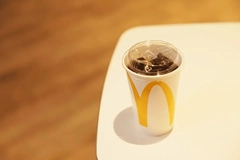McDonald’s Japan launches rPET strawless lids to cut waste
Key takeaways
- McDonald’s Japan is replacing plastic cold drink lids with strawless lids made entirely from rPET nationwide starting this month.
- The lids are developed for convenience and spill prevention across dine-in, takeout, delivery, and drive-thru channels.
- McDonald’s Japan is phasing out paper straws while transitioning to sustainable materials for packaging.

McDonald’s Japan will gradually change its cold drink lids for paper cups to strawless lids made entirely from recycled PET (rPET) nationwide, starting November 19. With the introduction of the lids, paper straws will be gradually phased out for select beverage items.
Developed over the course of three years, the strawless lid was designed to meet different consumer needs, including in-store dining, takeout, delivery, and drive-thru. The lid allows customers to drink easily without a straw, features a spout that opens smoothly, and is engineered to prevent accidental spills during takeout or delivery.
McDonald’s explains that carbonated drinks are less likely to spray out from strawless lids due to the internal pressure of carbon dioxide caused by vibrations when transported.

“We are currently making steady progress toward our commitment, and by changing the materials used in our containers and packaging between 2022 and 2025, we expect to reduce virgin plastic use by approximately 6,600 tons per year,” says the company.
Moving to sustainable materials
McDonald’s Japan has also set a goal of changing all containers and packaging provided to customers with recyclable, recycled, or certified materials by the end of 2025.
The company will gradually introduce new plastic bags made from 95% biomass plastic across all restaurants nationwide.
“Customers can help reduce environmental impact without any additional burden,” says the company. “For further environmental benefits, we ask that consumers continue to let us know when they do not need plastic bags and to cooperate with us in using simple packaging.”
McDonald’s Japan’s Happy Meal (known locally as the Happy Set) includes picture books that were previously made with virgin plastic. The company is transitioning these books to FSC-certified paper softcovers. In addition, the materials used for the book packaging are being updated, with vinyl packaging replaced by FSC-certified paper bags.
Meanwhile, in East Asia, McDonald’s Taiwan replaced plastic lamination and paper boxes for select menu items with eco-friendly paper wraps and bags, as part of its ongoing efforts to reduce plastic use.











